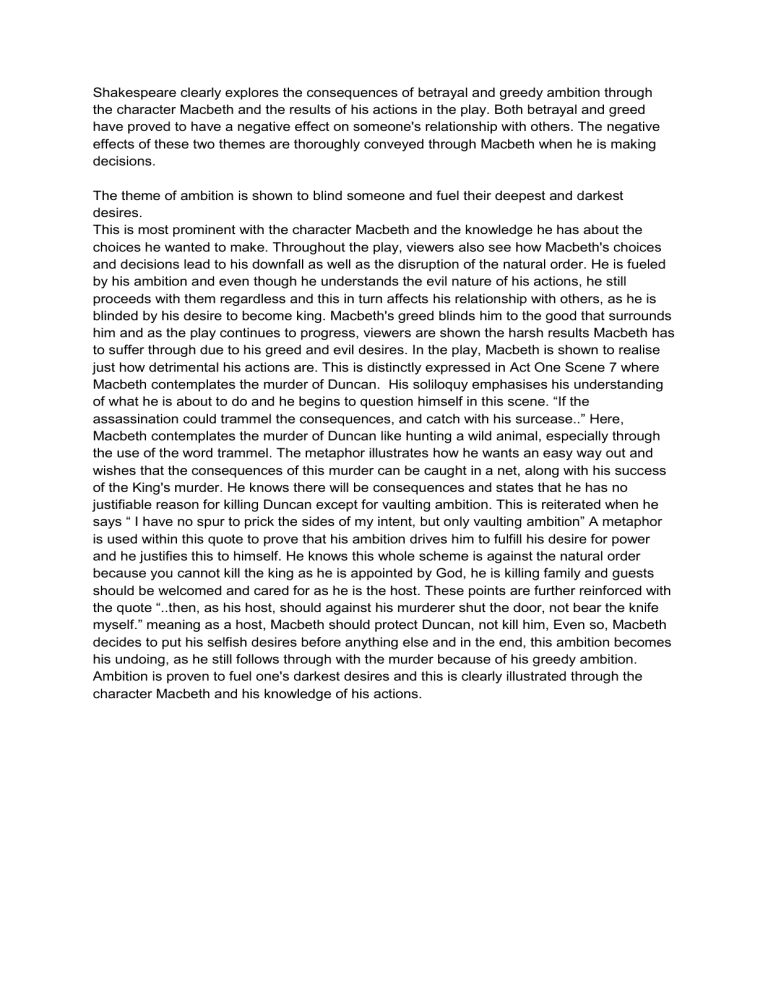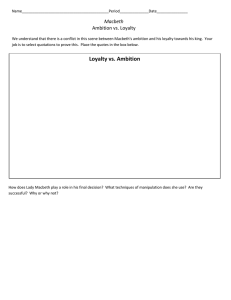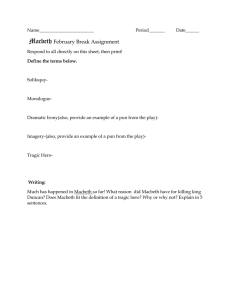
Shakespeare clearly explores the consequences of betrayal and greedy ambition through the character Macbeth and the results of his actions in the play. Both betrayal and greed have proved to have a negative effect on someone's relationship with others. The negative effects of these two themes are thoroughly conveyed through Macbeth when he is making decisions. The theme of ambition is shown to blind someone and fuel their deepest and darkest desires. This is most prominent with the character Macbeth and the knowledge he has about the choices he wanted to make. Throughout the play, viewers also see how Macbeth's choices and decisions lead to his downfall as well as the disruption of the natural order. He is fueled by his ambition and even though he understands the evil nature of his actions, he still proceeds with them regardless and this in turn affects his relationship with others, as he is blinded by his desire to become king. Macbeth's greed blinds him to the good that surrounds him and as the play continues to progress, viewers are shown the harsh results Macbeth has to suffer through due to his greed and evil desires. In the play, Macbeth is shown to realise just how detrimental his actions are. This is distinctly expressed in Act One Scene 7 where Macbeth contemplates the murder of Duncan. His soliloquy emphasises his understanding of what he is about to do and he begins to question himself in this scene. “If the assassination could trammel the consequences, and catch with his surcease..” Here, Macbeth contemplates the murder of Duncan like hunting a wild animal, especially through the use of the word trammel. The metaphor illustrates how he wants an easy way out and wishes that the consequences of this murder can be caught in a net, along with his success of the King's murder. He knows there will be consequences and states that he has no justifiable reason for killing Duncan except for vaulting ambition. This is reiterated when he says “ I have no spur to prick the sides of my intent, but only vaulting ambition” A metaphor is used within this quote to prove that his ambition drives him to fulfill his desire for power and he justifies this to himself. He knows this whole scheme is against the natural order because you cannot kill the king as he is appointed by God, he is killing family and guests should be welcomed and cared for as he is the host. These points are further reinforced with the quote “..then, as his host, should against his murderer shut the door, not bear the knife myself.” meaning as a host, Macbeth should protect Duncan, not kill him, Even so, Macbeth decides to put his selfish desires before anything else and in the end, this ambition becomes his undoing, as he still follows through with the murder because of his greedy ambition. Ambition is proven to fuel one's darkest desires and this is clearly illustrated through the character Macbeth and his knowledge of his actions. The acts of betrayal in Macbeth are shown to influence someone to become the worst version of themselves. Betrayal is shown to be a significant theme throughout the entire play especially in Act One. From the beginning of the play to the end, the audience sees the way in which the consequences of betrayal affect an individual and their relationships. A main example of this is the relationship with Macbeth and Banquo and the extreme actions Macbeth takes to become king. He resorts to murder and this destroys his relationships with those that are close to him. Macbeth continuously makes irrational choices which influences him to make reckless and selfish decisions based on the deceiving words he decides to believe. His reliance on the witches encourages him to betray the king and his naivety and greed cloud his mind from the good that surrounds him. The first sign of betrayal is evident within “Macbeth” in the first act where the Thane of Cawdor has his title taken away because of his betrayal and Macbeth is rewarded for his loyalty by being given the title as the new Thane of Cawdor. King Duncan trusted the Thane of Cawdor up until he killed him and this directly foreshadows how he is surrounded by those who wish to overthrow him because he is too trusting. This scene clearly shows how betrayal is the most prominent theme of the play and how it leads to consequences for an individual. In scene 6 of Act 1, Duncan arrives at the palace, commenting on how welcoming and pleasant it seems. “This castle hath a pleasant seat; the air nimbly and sweetly recommends itself unto our gentle senses.” This is dramatic irony because both Macbeth and Lady Macbeth aren’t planning anything welcoming or pleasant at all as they plan to kill him. In Act 3 Scene 1, Banquo voices his thoughts about Macbeth and his suspicions about Macbeth's betrayal. He states that “I fear, thou play’dst most foully for’t. In this quote, alliteration is used in the ‘f’ sounds and the words ‘fear, foully and for’t express Banquo's anger and frustration for the current situation. This specifically shows how his relationship with Macbeth is becoming more distant and he doesn't believe he can trust him anymore. Shakespeare's Macbeth clearly shows how the theme of betrayal affects an individual's life and relationships. Overall, the play Macbeth by Shakespeare evidently proves how ambition and betrayal affect an individual and how they can fuel one's actions negatively, resulting in harsh consequences for not only themselves, but the people and the world around them.


